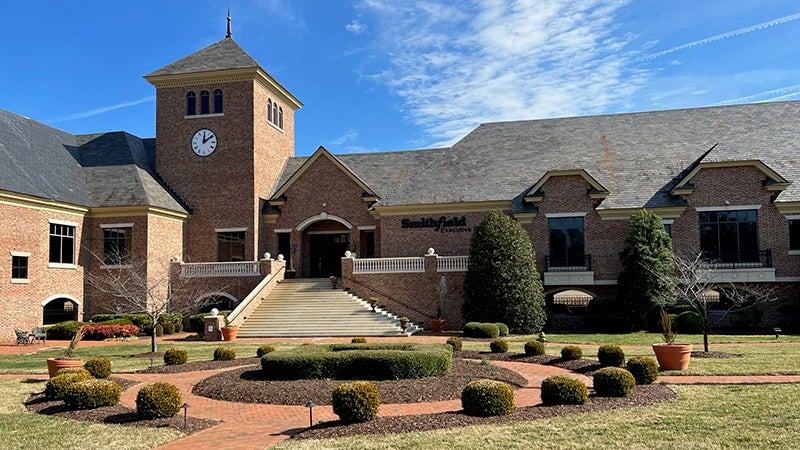Report: Smithfield Foods holds majority of Chinese-owned Virginia farmland
Published 4:16 pm Tuesday, July 11, 2023

- Smithfield Foods' global headquarters is on the banks of the Pagan River.
Company disputes state data
A Smithfield Foods subsidiary accounts for the majority of Chinese-owned farmland in Virginia, according to a report by the state’s Department of Agriculture and Consumer Services. The world’s largest pork processor disputes the numbers.
A new state law barring China and other designated “foreign adversaries” from owning Virginia farmland requires the department to release data on foreign-owned agricultural land annually on July 1. For 2021, the most recent year listed in the report, the document lists 13,389 acres, or 96% of the state’s 13,890 acres of Chinese-held land, as being under the ownership of Smithfield hog-farming subsidiary Murphy Brown LLC.
Five-hundred-one acres spanning Loudoun, Charlotte and Stafford counties account for the remaining 4%, and the state’s only Chinese-owned land not tied to Smithfield Foods. The report lists 91 of those acres as being in non-agricultural use.
Jim Monroe, vice president of corporate affairs for Smithfield Foods, contends the company and its subsidiaries own less than 4,000 acres statewide.
According to the report, Murphy Brown’s acreage has been under Chinese ownership since 2013, the same year Hong Kong-based WH Group purchased Smithfield Foods for just under $5 billion. Smithfield acquired Murphy Farms Inc. in 2000 and merged its hog-farming operations with Brown’s of Carolina Inc. in 2001 to form Murphy Brown, according to past reporting by The Smithfield Times and Associated Press.
Of the reported 13,389 acres, 2,089 are listed as being in Isle of Wight County, where Smithfield Foods has been based since its 1936 founding. Murphy Brown is listed as owning 8,534 acres in Surry County and 479 acres in Southampton County, both of which border Isle of Wight to the west. The remaining 2,287 acres are divided between Sussex and Greensville counties.
Monroe contends Smithfield owns 1,042 acres in Isle of Wight – less than half the acreage listed in the state report.
In Surry, local tax records show – and Monroe confirmed – that the company owns seven parcels totaling 853 acres. The Surry parcels are owned by Smithfield-Carroll’s Farms, another subsidiary.
According to Michael Wallace, a Virginia Department of Agriculture and Consumer Services spokesman, the data in the July 1 report came from a U.S. Department of Agriculture report on foreign-held land nationwide.
The USDA’s Farm Service Agency, Wallace said, disseminates its own annual report as required under the federal Agriculture and Foreign Investment Disclosure Act.
The act requires any foreigner who purchases or transfers interest in agricultural land to report the transaction to the U.S. Secretary of Agriculture within 90 days.
China, according to the Virginia report, accounts for 5.4% of the state’s 254,494 acres of foreign-held agricultural land. Canada holds the most, at 41,357 acres, or 16%, followed by the United Kingdom at 39,289 acres, or 15%.
The percentages roughly mirror the largest foreign landowners nationwide.
According to the USDA’s 2021 report, Canadian investors owned 12.8 million acres across the United States, or 31%, accounting for the single largest percentage of foreign-held agricultural and non-agricultural land. The Netherlands, Italy, the United Kingdom and Germany collectively held another 31%. China held 383,935 acres, accounting for just under 1%.
Gov. Glenn Youngkin signed the “foreign adversaries” legislation on March 27, declaring “void” any purchase on or after Jan. 1, 2023, of farmland by a “foreign government or nongovernment person” the U.S. Secretary of Commerce has determined to have “engaged in a long-term pattern or serious instance of conduct significantly adverse” to national security. The secretary’s list, as of March 30, named five nations, including China and its Hong Kong Special Administrative Region.
The new state law allows Virginia’s attorney general or any county, city or town attorney in a locality where a foreign land purchase has occurred to “file an action” to “eject the foreign adversary from possession,” at which point the land would be deeded to the state at no cost.
But given that the two largest foreign landowners in Virginia are United States allies, “VDACS does not recommend any legislative, regulatory, or administrative policy changes in light of the information in this report,” the Virginia report states.
Smithfield Foods is “not owned or controlled by a foreign government” and therefore won’t be impacted by Virginia’s new foreign adversaries law, Monroe contended in April. WH Group, he explained then, is publicly traded with investors from around the world, including the United States.
Just over a month after Smithfield announced its now decade-old merger with WH Group, then known as Shuanghui International Holdings Ltd., former U.S.-China Economic and Security Review Commissioner Daniel Slane testified at a July 10, 2013, U.S. Senate Committee hearing that Shuanghui was a “Chinese state-controlled company.” Former Smithfield President and CEO Larry Pope, at the same hearing, testified that the company would be “the same old Smithfield, only better” and asserted the Chinese government had “absolutely no ownership stake or management control in Shuanghui.”
Del. Robert Bloxom, R-Accomack, who sponsored the House of Delegates version of the foreign adversaries bill, and Simon Stevenson, the Robert Stanton endowed chair of real estate and economic development at Old Dominion University, each told the Times in April they concurred that Smithfield Foods would likely be unaffected, as did Youngkin spokeswoman Macaulay Porter.





